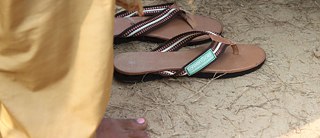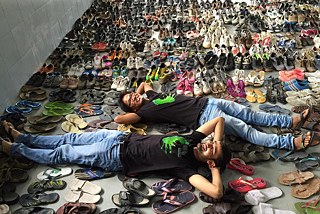Recycling
Slippers WITH A CONSCIENCE

A daily sight in several parts of rural India is that of young, excited children running to and fro their government-run local schools. But often missing—any form of footwear protecting their feet. “It would hurt a lot when I walked,” says 9 year old Natisha, a student from rural Maharashtra. “Thorns would poke the soles of my feet.” Natisha is one of several young students across Indian villages and semi-urban areas that suffer from this resource gap. Correction: was one.
Today, Natisha runs across her school with no fear of pain or injury, her feet firmly protected by a pair of brightly coloured, recycled slippers. And that's true for over 50,000 children across rural area, as a result of an innovative start-up run by two young entrepreneurs: Shriyans Bhandari and Ramesh Dhami.

SOLEFUL BEGINNINGS
“We’re athletes, my co-founder and I,” 23 year old Shriyans tells me, “We realized that each year, we’d end up throwing out three to four pairs of expensive running shoes due to wear and tear.” As he explained further, these shoes, once discarded, would end up in the mammoth mounds of garbage that form India’s burgeoning landfills. And it’s a bigger problem than most people realize.Every year, more than 350 million shoes are discarded across the globe. A majority of these last-season-fashion pieces have midsoles made of Ethylene Vinyl Acetate, which stay in landfills without decomposing for up to 1,000 years. That means, a pair of old sneakers that you toss could out-live you by 10 centuries, not to mention the process of manufacturing one pair of running shoes is the equivalent of leaving a 100 watt bulb burning for a week. the sheer scale of that problem struck Shriyans and Ramesh hard. Putting their minds together, a possible solution took shape; all they needed was a shoe box and a busy jogging track in the city of Mumbai.
SHOE-BOX TO START-UP
The young, creative twosome placed a shoe collection box at a large jogging track at Mumbai's Mahalaxmi Racecourse and asked people to toss in their old, withering running shoes. Soon enough, joggers began discarding their old footwear, and the entrepreneurs had start-up material.“Shoes become unfit for running so people through them out, but in most cases, the soles are still in good condition," Shriyans says. Figuring out how to use those soles was the next task. "I was 19 when we first started with it, we had no background in footwear or manufacturing or any such industry. So, we went to experts who were making footwear and got a few prototypes made."

SUSTAINABILITY & SCALE
As per a recent report by WHO, 1.5 billion people across the world are infected by diseases that could be prevented by wearing proper footwear. Tackling this need gap was the next step.Once the mechanism of collection and refurbishing was in place, it was time to distribute the products. The pair then identified villages across Maharashtra and Gujarat, and partnered with NGOs in these areas. Through need surveys and research within communities, they counted how many children needed footwear in each area, and then arranged distribution drives accordingly.
Picture this: hundreds of school children lined up in height order, each of them probably wondering which school activity they were being taken to next. Their wait is soon charged with curiosity and confusion, as they are told that the exercise was to measure their feet. As their heels and toes were drawn on pieces of paper and recorded, a list was made. And every child was then provided with a size-specific, colourful pair of recycled GreenSole slippers.
In order to cater to as many students as possible, the duo approached corporate partners such as Axis Bank, MakeMyTrip, Rolls-Royce, L&T, Justdial and so on for shoe donations and support under CSR (Corporate Social Responsibility) programmes. While the slippers are provided free of cost to children from marginalised communities, they are also sold online in order to make the model self-sustainable. The funds collected from sales are then ploughed back into the manufacturing and distribution processes, and used to expand operations.
START-UPS GOING GREEN
Recycling has always been a motto we print on t-shirts, or a slogan we teach children in schools, however new-age start-ups across India have turned that Ecology lesson into an Economics one. Apart from aiding the anti climate change green movements that the world needs, these green start-ups are also lucrative with sound business plans. For instance, Karma Recycling, a 4-year-old start-up is attempting to refurbish old technological devices to lower the e-waste burden on our landfills. Protoprint, a pune-based young company has tied up with the city's wastepicker network to gather plastic waste, and then converts this waste into filaments for 3D printing.These innovative solutions can not only serve the enivornment, but can also redirect venture capital and investments into greener causes backed by viable business models. Not to mention, if done with a conscience, those recycled goods can be put towards bridging the large, gaping resource gap that exists in unequal societies.


